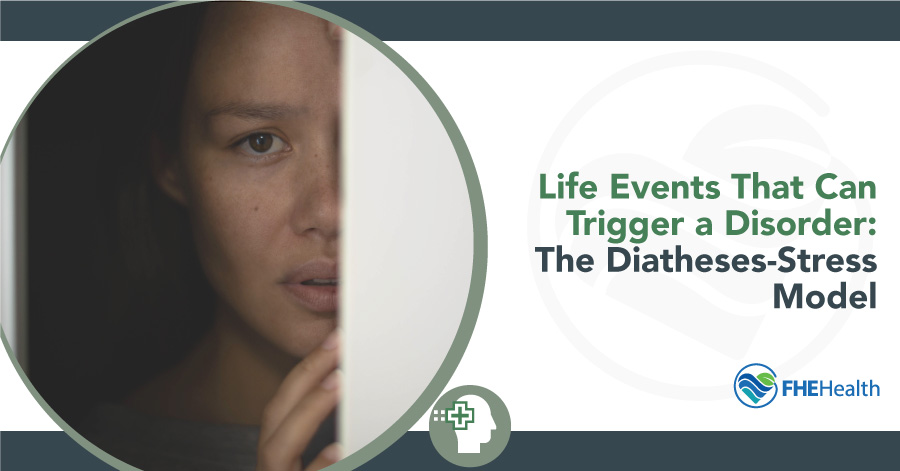
This article has been reviewed for accuracy by our peer review team which includes clinicians and medical professionals. Learn more about our peer review process.
Many of us are aware that our genetics may predispose us to certain conditions. For instance, we know that not everyone who develops a cigarette habit will develop cancer or that not all people who live in a smog-filled city will suffer from respiratory problems.
In a similar vein, there are certain genetically inherited vulnerabilities that people can have when it comes to mental health, too. And, while it is possible for a person to develop a mental illness without any triggers, more often than not a life event will trigger their condition—especially if they have a genetic predisposition for it.
When some people experience a life event such as a breakup, job loss, or the loss of a loved one, they may suffer symptoms of anxiety or depression that lead to a clinical diagnosis. In fact, psychiatrists believe that many people who develop a wide range of mental health disorders only develop these conditions after something in their environment or life experience has triggered the issue. When these conditions develop as a result of stress, healthcare providers use a model known as the “diathesis-stress model” to explain how and why this occurs.
In this article, we’ll explain the diathesis model in more detail and explore how stressful life events and certain inherent mental health vulnerabilities can cause some people to develop a mental health problem.
Defining the Model: What Is the Diathesis-Stress Model?
The term “diathesis” is used to describe an individual’s vulnerability or a predisposition to a particular medical condition. These predispositions can be physical as well as psychological. Initially, psychiatrists used this term in relation to the study of schizophrenia and then to depression. In fact, it’s often used to discuss individuals with suicidal tendencies.
Often, a diathesis is a biological or genetic factor—a vulnerability we’ve inherited in our genes; but it can also be an environmental factor such as a traumatic event in early childhood; and, it could be a vulnerability that developed from an interaction between a person’s genes and environmental factors.
This model is helpful for mental health practitioners as well as patients because it describes how the interaction between a vulnerability and environmental stress may lead to the development of a mental health disorder. In fact, sometimes this model is referred to as the “stress-vulnerability model.”
A predisposition for a certain condition is, of course, a vulnerability. When that vulnerability is subjected to stress, the person is more likely to develop a disorder as a result. A person who does not have a predisposition may also develop a disorder, but typically as the result of significantly more stress than what might trigger a person who has a genetic predisposition.
The diathesis-stress model supposes that mental health disorders are caused by a predisposition and stress. Researchers suggest that this combination of predisposition and stress is why some individuals develop mental disorders and others do not.
What Is the Value of Using a Model to Understand Mental Disorders?
The diathesis-stress model is helpful to medical researchers and professionals working in the field of mental health, because it explains how the interplay between genetics and environmental stressors (nature and nurture) can cause mental disorders to develop. The model has not been a stationary one either. It has evolved to demonstrate that some predispositions aren’t necessarily genetic at all. For instance, a highly stressful event in childhood can leave someone predisposed to develop a mood or mental disorder later in life when they encounter a particularly stressful event.
The model may also help some practitioners pinpoint who is likely to suffer from a mental disorder and who is not. For instance, when a child suffers from a traumatic event, a counseling intervention may help. Teaching these individuals positive coping strategies for dealing with stress may help them reduce their vulnerability when they encounter stress down the road.
Are All People Genetically Predisposed to Disorders?
The diathesis-stress model does suppose that it is possible for anyone to develop a mental disorder. However, some people are simply more vulnerable than others because of a predisposition that may be genetic or environmental. Informally speaking, it can be helpful to compare mental health to a gas tank. People who have no vulnerabilities, mentally speaking, may be operating with a full tank. People who have those predispositions may be running on low fuel, and when a stressful event occurs, their red light goes on and they’ve now got a problem to contend with.
The fact is, everyone is vulnerable to mental health disturbances. Whether or not they develop a clinical diagnosis depends on the disturbance and the person’s predispositions. Given certain conditions or circumstances, anyone can develop a mental disorder; no one is completely immune. Some people simply have more tolerance for stress.






